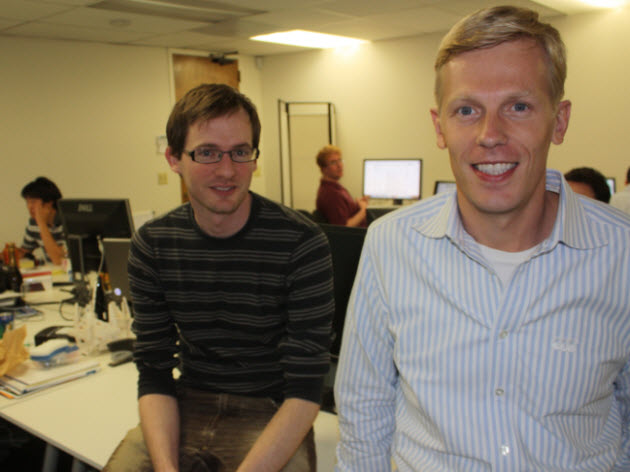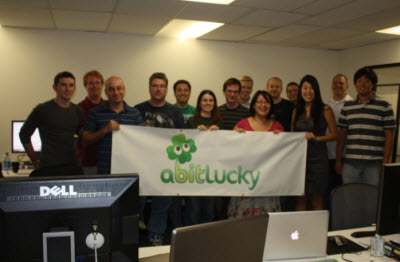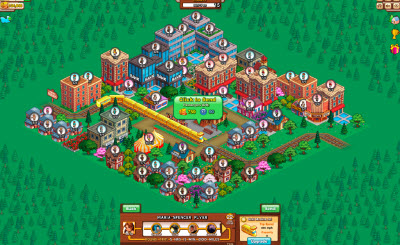 With social gaming consolidating around big startups, people are starting to wonder if there is no more room for Facebook game startups. But the team at A Bit Lucky has been a bit lucky in proving that assumption wrong.
With social gaming consolidating around big startups, people are starting to wonder if there is no more room for Facebook game startups. But the team at A Bit Lucky has been a bit lucky in proving that assumption wrong.
 With its first game, Lucky Train, A Bit Lucky has scored more than 1.5 million users on Facebook. That’s enough for the 20-person company to keep investing in the app as a service, or something that is upgraded or maintained for the users every day.
With its first game, Lucky Train, A Bit Lucky has scored more than 1.5 million users on Facebook. That’s enough for the 20-person company to keep investing in the app as a service, or something that is upgraded or maintained for the users every day.
Frederic Descamps (pictured top, right), chief executive of the Redwood City, Calif. company, said in an interview that the company has done well by focusing on its quality game design and breaking some of the rules. The presence of startups such as A Bit Lucky shows that there is room for a wave of companies in social games that are coming behind the leaders who are already on the merger warpath.
The first rule it broke was the notion that Facebook games have to be appealing to women in order to succeed, since many of Facebook’s 500 million users (and its 200 million game players) are women. Trains are decidedly a boy thing, as stereotypes go, and so it was a risk making a train simulator for a first game. The game is particularly popular with parents who have young kids, but it’s also popular with just about anyone. Roughly 65 percent of players are male.
The game play is simple. You create a train and then send it to your friends. They can load it with passengers. Each time one of your trains makes a round trip between different players, you get coins and experience points. Then you can use those rewards to decorate your county or create more impressive trains. The fun part is that you never really know what your friends are going to send you.
Sending messages to your friends about your trains is a natural part of the game play, and it also happens to be a good way to help the game spread. That fact is more important because Facebook cracked down in the spring on viral communications, making it harder for startups with no current game audiences to spread in a viral way.
 Jordan Maynard (pictured top left), chief creative officer at A Bit Lucky, also made a bet that a deeply designed game would work well on Facebook. Maynard and Descamps worked together on hardcore online games at Trion Worlds, which has been making massively multiplayer online games for the past five years. Maynard also worked on Spore at Electronic Arts, and the team of 20 people includes a number of video game veterans.
Jordan Maynard (pictured top left), chief creative officer at A Bit Lucky, also made a bet that a deeply designed game would work well on Facebook. Maynard and Descamps worked together on hardcore online games at Trion Worlds, which has been making massively multiplayer online games for the past five years. Maynard also worked on Spore at Electronic Arts, and the team of 20 people includes a number of video game veterans.
With A Bit Lucky, they can now work on something that gets them feedback much more quickly. They started the company in November of last year, raised money in February, launched the game in June, and are now busy doing updates for the game, such as creating Halloween-themed material.
They were pretty late in starting a new game company on Facebook. Just before they started, Electronic Arts began a consolidation phase by purchasing Playfish for as much as $400 million. But Descamps, who was also a veteran of the startup Xfire, and Maynard were excited about the new opportunities in social games. Descamps started a regular social game entrepreneur party, partly to learn from others and partly to recruit employees. The parties have now grown to hundreds of people, a reflection of the buzz around social games in Silicon Valley. It was a very social way for A Bit Lucky to dive into the social gaming universe.

The fans are pretty dedicated. The average play session is about 13 minutes, which is about four or five times higher than the average play session for a Facebook game. Players have created 7.5 million trains since the game launched in June, and there have been 21 million train stops in the past month. More than 70 million round trips, where players send a train to a friend and they send it back, have been completed in the last month. About 200,000 users play the game on any given day. Those are all good metrics.
“We feel that our numbers show that our social game is more social than a lot of other ‘social games’ are,” Maynard said.
One of the reasons the game has done well is that the animation is fast for Facebook, where load screens on social games can be painfully slow. The company also used Applifier, a promotion bar that is installed on top of the game and promotes a bunch of third-party games. It helps games feed users to each other.
For sure, it’s a crowded market, with bigger companies such as Zynga, Disney Playdom, EA-Playfish, CrowdStar, LOLapps, Digital Chocolate, Booyah and others. The list goes on and on. In the Facebook game space, it’s becoming harder to find spaces that others aren’t already occupying. Maynard said that doesn’t mean startups can’t compete with the big companies. It just means they can’t use the exact same tactics — such as heavily advertising — to fight them.
A Bit Lucky has raised $2.6 million from angels including SV Angel (Ron Conway’s firm), Chris Dixon’s Founder Collective, Aydin Senkut’s Felicis Ventures, Red Octane founders Charles and Kai Huang, IGN co-founder Mark Jung, Google M&A chief David Lawee, Lerer Ventures, Delicious founder Joshua Schachter, early Facebook employee Jed Stremel, and XG Ventures. With that group behind it, A Bit Lucky should have a chance to do something unique.
You could say that Lucky Train is a copy of old train simulators such as Railroad Tycoon, but it’s more accurate to say that it’s a reinterpretation of that once-popular genre for the modern era. Maynard knows games from the older days because his father was an early employee at Electronic Arts. For more than a decade, he has worked on games where users have been very engaged with the content, and he believes that measure will become more important in the future. To keep users engaged, small Facebook startups will have to take more risks.

![]() Getting content noticed is a challenge for everyone making apps. We’ll cover the topic at DiscoveryBeat 2010. Startups and big companies alike should consider entering our Needle in the Haystack discovery business idea competition. VentureBeat would like to thank the industry leaders that are supporting DiscoveryBeat 2010, including co-host Flurry, AppLaunchPR, Herakles Data Center, Adobe, Offermobi, Appolicious, and appbackr. Unique sponsorships are still available. For more information contact sponsors@venturebeat.com. To buy tickets, click on this link.
Getting content noticed is a challenge for everyone making apps. We’ll cover the topic at DiscoveryBeat 2010. Startups and big companies alike should consider entering our Needle in the Haystack discovery business idea competition. VentureBeat would like to thank the industry leaders that are supporting DiscoveryBeat 2010, including co-host Flurry, AppLaunchPR, Herakles Data Center, Adobe, Offermobi, Appolicious, and appbackr. Unique sponsorships are still available. For more information contact sponsors@venturebeat.com. To buy tickets, click on this link.
VentureBeat's mission is to be a digital town square for technical decision-makers to gain knowledge about transformative enterprise technology and transact. Learn More
